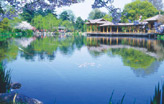Politics
Scrutiny on global nuclear industry intensifies
Updated: 2011-03-17 09:22
(Agencies)
HOUSTON- The crisis in Japan means higher costs, canceled projects and laser-like regulatory scrutiny for the global nuclear industry, signaling the likely end to its decade-long growth spurt.
|
||||
US Secretary of State Hillary Clinton flagged her concern about industry risk on Wednesday, days after senators had asked for a review. The United States relies on nuclear energy for 20 percent of its power, and until now the Obama administration's energy policy has been nuclear-friendly.
"What's happening in Japan raised questions about the costs and the risks associated with nuclear power, but we have to answer those," Clinton told MSNBC.
Germany went a step further, shutting down seven older reactors this week in response to the incident in Japan.
Such actions promise to trigger a ripple effect around the world, throwing up hurdles for power generation companies on the brink of huge expansion.
On the drawing board are plans to more than double the number of nuclear power plants worldwide. There are 477 proposed or planned plants, compared with the 441 already in operation. China, Russia and India account for the bulk of the growth, according to data from the World Nuclear Association.
A pullback to review safety, let alone impose new regulations, will affect companies such as Shaw Group , which builds reactors, uranium producers that supply fuel and those that design the piping and instrumentation.
Other big players in nuclear construction and equipment are privately owned Bectel Corp, General Electric , Babcock & Wilcox and Areva SA .
US SCRUTINY
Operators in the United States will face more scrutiny from the government for new units, requiring them to spend more to build to a higher standard, analysts said.
Already the capital costs to build a plant are high- more than $4,000 a kilowatt for a nuclear plant. That's nearly twice as much as a conventional coal-fired plant at $2,200 a kw and more than four times as much as a gas-fired plant, according to a Brattle Group study.
New regulations could put some nuclear plants in jeopardy.
"Here in the United States, the problem is likely to be nonmaintenance capital expenditures - safety-driven retrofits to reactors or fuel-storage sites that make it uneconomical to continue operating when other alternatives provide cheaper power or greater investor returns," said Kevin Book, managing director for research at Washington-based ClearView Energy Partners.
Once built, nuclear power was traditionally cheaper than natural gas and coal - markets that historically have been extremely volatile.
But even that advantage has eroded. The development of massive shale gas fields in North America, believed to hold a century's worth of the fuel, have depressed natural gas prices, a situation that is not expected to change for years.
Nuclear power averaged 6.6 cents a kilowatt-hour versus 6.5 cents for natural gas and 6.2 cents a kilowatt-hour for coal, according to 2009 study from the Massachusetts Institute of Technology.
US Energy Secretary Steven Chu told Congress on Wednesday federal regulators will check to see if safety measures need to be boosted at current and proposed US reactors.
Companies that will likely draw scrutiny from regulators and more opposition from the public include Entergy Corp , which owns Indian Point located north of New York City, and Southern Co , which is still working to obtain a construction license for its Vogtle expansion in Georgia, Barclays said.
Pacific Gas and Electric and Edison International - companies that have plants in earthquake-prone California - should expect stiffer treatment from the Nuclear Regulatory Commission as well as more attention from groups that oppose nuclear power.
GAS VS NUCLEAR
Since building a power plant fueled by natural gas is much less expensive than building a nuclear plant, power companies seeking to avoid the political and economic risk may go the gas route instead, analysts said.
Despite the expected increase in costs and new regulation, many world leaders have declared their industry safe and have said nuclear power is needed to meet the world's surging demand for electricity.
Russian President Dmitry Medvedev, speaking at a briefing with Turkish Prime Minister Tayyip Erdogan said on Wednesday that nuclear energy is safe provided power stations are built in the right place and are designed and managed properly.
"Everyone is asking a simple question: can atomic energy be safe? The answer is clear: it can be and is safe, but for this it is necessary to make the right decisions about the location of the plant, about the design and the operator," Medvedev said.
Russia plans to build Turkey's first nuclear power station. Erdogan has said Turkey's plans to build two nuclear power plants with Japanese and Russian help were unchanged.
The proposed site for the $20 billion plant to be built by Russian state nuclear corporation Rosatom is near the coastal city of Mersin, some 25 km (15 miles) from an active fault.
French President Nicholas Sarkozy also said on Wednesday that he did not expect the crisis in Japan to undermine the case for new nuclear projects. France relies heavily on power generated by nuclear.
E-paper

City of Joy
Welcome to the 'world of smiles' where life meanders slowly.
Debate on nuclear power revived
The future is now
Common approach
Specials

Earthquake Hits Japan
A massive 8.8 magnitude quake hit the northeast coast of Japan on March 11,2011.

NPC & CPPCC sessions
Lawmakers and political advisers gather in Beijing to discuss major issues.

Slide: Japan quake
Devastating earthquake and tsunami left millions without water, electricity, homes or heat.



